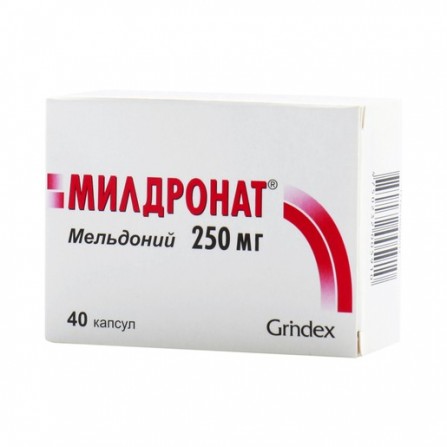Brand name
Mildronate
Release form
Capsules
Composition
Active ingredient:
Meldonium
(Meldonium) Concentration of active ingredient (mg): 250
Pharmacological effect
Pharmacological action - antianginal, angioprotective, antihypoxic, cardioprotective.
Pharmacokinetics
When ingested quickly absorbed. Bioavailability is about 78%. Cmax in plasma is 1–2 hours after ingestion. Metabolized in the body mainly in the liver with the formation of two major metabolites, which are excreted by the kidneys. T1 / 2 when taken orally is 3-6 hours and depends on the dose.
Indications
Nematodosis (ascariasis, enterobiosis, ankilostomidoz, nekatorosis, trichocephalosis, etc.). Mixed helminthic invasions. Strogiloidosis, neurocysticercosis, caused by the larval form of the pork tapeworm (Taenia solium); echinococcosis of the liver, lungs, peritoneum, caused by the larval form of canine tapeworm (Echinococcus granulosus). As an aid in the surgical treatment of echinococcosis cysts. Giardiasis and toxocariasis.
Contraindications
Hypersensitivity to
Mildronate
, increased intracranial pressure (in violation of the venous outflow, intracranial tumors).
Use during pregnancy and lactation
Safety of use in pregnant women has not been studied, therefore, in order to avoid possible adverse effects on the fetus, the use of the drug in pregnant women is contraindicated. Excretion with milk and the impact on the health of the newborn have not been studied, therefore, if necessary, use the drug should stop breastfeeding.
Dosage and administration
In view of the possible development of an exciting effect, it is recommended to apply it in the first half of the day. Cardiovascular diseases. In the complex therapy of 0.5-1 g per day by mouth or intravenously (5-10 ml of solution for injection 0.5 g / 5 ml), applying the entire dose at once or dividing it by 2 times. The course of treatment is 4-6 weeks. Cardialgia on the background of dyshormonal dystrophy of the myocardium - inside, 0.25 g, 2 times a day. The course of treatment is 12 days. Violation of cerebral circulation. The acute phase - 0.5 g once a day intravenously for 10 days, turning into the oral administration of 0.5–1 g per day. The general course of treatment is 4-6 weeks. Chronic disorders - 0.5 g orally per day.The general course of treatment is 4-6 weeks. Repeated courses (usually 2-3 times a year) are possible after consulting a doctor. Vascular pathology and dystrophic diseases of the retina. Parabulbarny on 0,5 ml of solution for injections of 0,5 g / 5 ml within 10 days.4. Mental and physical overload, including athletes. Adults take 0.25 g orally 4 times a day or 0.5 g intravenously 1 time a day. The course of treatment is 10-14 days. If necessary, repeat the treatment after 2-3 weeks. Athletes 0.5-1 g orally 2 times a day before workouts. The duration of the course in the preparatory period is 14-21 days, in the competition period - 10-14 days.5. Chronic alcoholism. Inside 0.5 g 4 times a day; intravenous - 0.5 g 2 times a day. The course of treatment is 7-10 days.
Side effects
Rarely - allergic reactions (redness, rash, itching, swelling), as well as dyspepsia, tachycardia, changes in blood pressure, agitation.
Overdose
No cases of overdose of Meldonium were reported. The drug is low toxic and does not cause severe adverse reactions. Symptoms: decrease in blood pressure, accompanied by headache, tachycardia, dizziness and general weakness. Treatment: symptomatic. In severe overdose, liver and kidney function must be monitored.
Interaction with other drugs
Meldonium can be used simultaneously with nitrates of prolonged action and other antianginal agents, cardiac glycosides and diuretic drugs. It can also be combined with anticoagulants, antiplatelet agents, antiarrhythmic drugs and other drugs that improve microcirculation. Meldonium can enhance the effect of nitroglycerin, nifedipine, beta-adrenergic blockers, other antihypertensive drugs and peripheral vasodilators. increase the risk of unwanted reactions.
special instructions
Patients with chronic liver and kidney diseases should be careful with long-term use of the drug. If necessary, a long (more than a month) use of the drug should be consulted with a specialist. The effect on the ability to drive vehicles and mechanisms.There is no evidence of adverse effects on the ability to drive a vehicle and perform potentially hazardous activities that require increased concentration and psychomotor speed.





